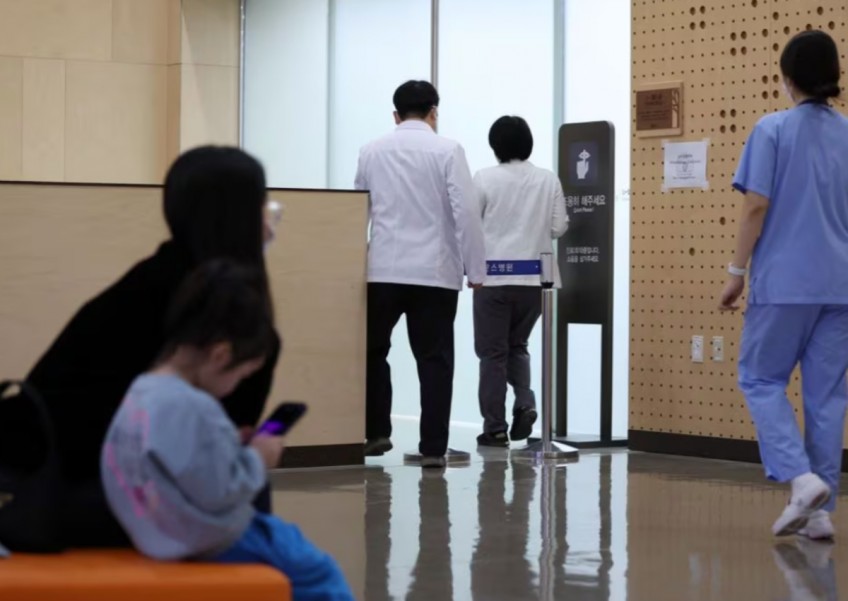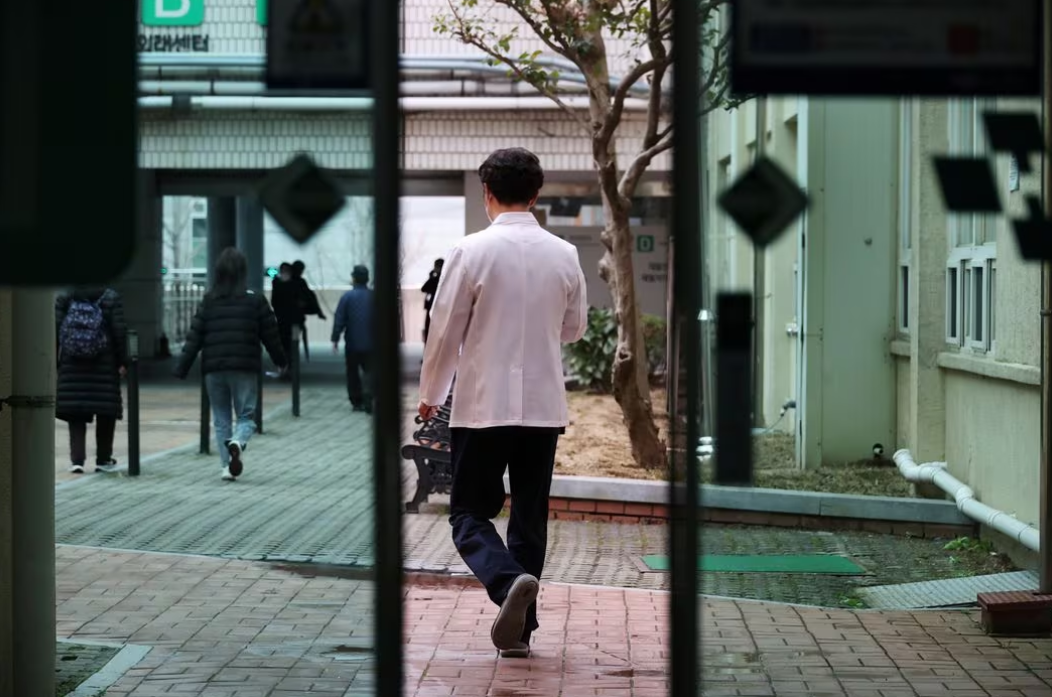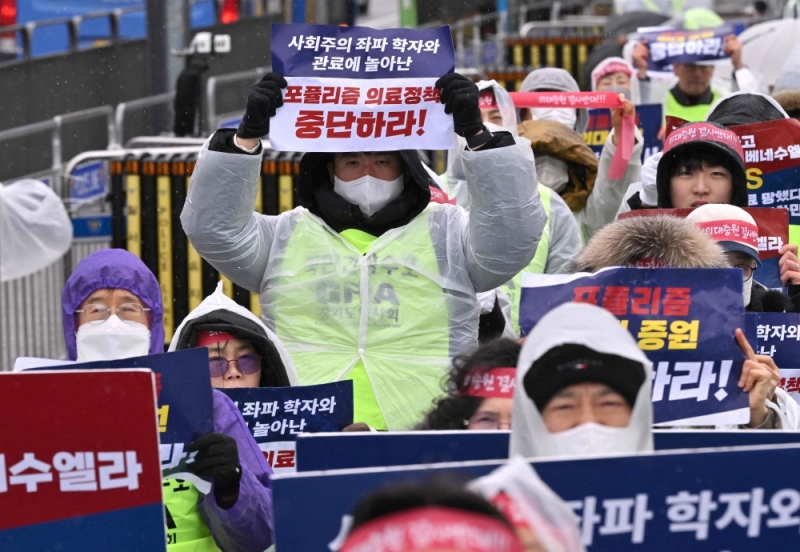South Korea orders striking doctors to return to work as their walkouts burden hospital operations
THE ASSOCIATED PRESS
February 21, 2024
SEOUL--South Korea on Wednesday officially ordered thousands of striking doctors to return to work immediately, a step that could lead to legal punishments if the doctors don’t end their walkouts, which have caused numerous cancellations of surgeries and other treatments at hospitals.
About 7,800 medical interns and residents in South Korea have walked off their jobs this week to protest the government’s push to recruit more medical students.
Officials say they want to increase the nationwide medical school admissions cap by 2,000 from next year to brace for South Korea’s rapidly aging population. But doctors’ groups have refuted the plan, saying universities aren’t ready to offer quality education to that many students. They also say the government’s plan would lead to increased public medical expenses since it lacks measures for how to raise low medical fees in some key professions.
The 2,000 additional admissions “is a nonsensical figure,” the Korean Intern Residents Association said in a statement Tuesday. “We hope the government will rethink its plan and formulate a policy that reflects the voices of trainee doctors.”
Junior doctors typically support senior doctors during surgeries and treat patients in hospitals. Their joint walkouts have burdened hospital operations. The Health Ministry said Wednesday that authorities have received 58 public complaints over the walkouts, mostly regarding indefinite delays of surgeries and cancellations of other medical treatments.
The government on Wednesday accused the trainee doctors of putting their rights before the lives of patients.
“The fundamental responsibility of medical personnel is caring for the lives and health of the people. I would say once again that any collective action that threatens this cannot be justified,” Vice Health Minister Park Min-soo told reporters.
Park said as of Tuesday night about 8,820 out of the country’s 13,000 trainee doctors have submitted resignations to their hospitals. None of their resignations has been approved, but about 7,810 of the doctors have left their work sites, Park said.
Park said the government issued an official order for most of the striking doctors to return to work.
South Korea’s medical law allows the government to issue such back-to-work orders to doctors and other medical personnel when there are concerns about public health. If they refuse to abide by the order, they could face up to three years in prison or 30 million won ($22,480) in fines, a punishment that would also lead to the revocation of their medical licenses, according to the law.
Park didn’t detail possible punishments but said the government would enforce the law in a principled manner. He called for dialogue with the striking doctors.
Trainee doctors said the government’s return-to-work order was intimidation and must be withdrawn immediately.
To deal with the trainee doctors’ walkouts, the government has opened military hospitals to the public, extended the operating hours of public medical institutions and had emergency medical treatment centers stay open around the clock. But observers say if the walkouts are prolonged or joined by senior doctors, that could cause major disruptions in South Korea’s overall medical service.
South Korea has a total of 140,000 doctors. The Korea Medical Association said it plans to hold rallies to support the trainees but hasn’t determined whether to launch strikes

Medical workers walk at a hospital in Seoul, South Korea, Feb 19, 2024.
PHOTO: Yonhap via Reuters
PUBLISHED FEBRUARY 21, 2024
SEOUL — Thousands of trainee doctors at South Korea's biggest hospitals joined a walkout on Wednesday (Feb 21) to protest a plan to admit more students to medical school, disrupting treatment for scores of patients, health authorities said.
The government wants to increase medical school admissions from 3,000 now to 5,000 from the 2025 academic year, and then add 10,000 more by 2035, in a bid to boost healthcare in remote areas and cope with the increasing demands of one of the world's most rapidly ageing societies.
Doctors and medical students who have joined the protest, however, say South Korea has enough doctors, and the authorities should first improve pay and working conditions, especially for specialists in demanding fields such as paediatrics and emergency medicine, before recruiting more students.
Park Min-soo, a vice health minister, called on the protesters to prioritise their patients over collective action.

PHOTO: Reuters
The protests began earlier this week, and the health ministry said that so far a total of 7,813 doctors had left their jobs, in defiance of a government order for them to stay at work. Doctors say the order is unconstitutional.
"I'd like to say once again that the basic calling of medical professionals is to protect the health and lives of the people, and any group action that threatens that cannot be justified," Park told reporters.
Due to the walk out, many hospital emergency rooms are now overcrowded, and five major hospitals in Seoul were cancelling a third to half of scheduled surgeries, local media said.
About 76 per cent of South Koreans back the government's plan to increase the number of medical students, a Gallup Korea poll showed last week, amid concerns over an acute staff shortages in paediatrics, emergency units and clinics outside the greater Seoul area.

PHOTO: Reuters
South Korea's population of 52 million had 2.6 doctors per 1,000 people in 2022, far below the 3.7 average for peers in the Organisation for Economic Co-operation and Development (OECD).
The Korea Interns and Residents Association, a group of doctors taking part in the protest, said they deserved better treatment including more pay.
The group also criticised the government's plan to increase the number of medical school students as a political ploy ahead of the April general election.
"We couldn't just sit back and watch medical policies built only for the sake of winning the general election. Even in a collapsing training environment, not a single resident wanted to leave the hospital," the association said in a statement.
ALSO READ: South Korea trainee doctors stage walkout over medical school quotas
Source: Reuters

Doctors hold placards reading ‘Stop populist medical policy!’ during a rally to protest against the government’s plan to raise the annual enrolment quota at medical schools. — AFP pic
Wednesday, 21 Feb 2024
SEOUL, Feb 21 — Pregnant women had C-sections cancelled and cancer treatments were postponed today as the number of South Korean trainee doctors to walk off the job over proposed reforms swelled, officials and local reports said.
More than 8,800 junior doctors — 71 per cent of the trainee workforce — have now quit, said Seoul’s Second Vice Health Minister Park Min-soo, part of a spiralling protest against government plans to sharply increase medical school admissions.
Seoul says the reforms are essential, citing the country’s low doctor numbers and rapidly ageing population, but doctors claim the changes will hurt service provision and education quality.
Critics say doctors are mainly concerned the reform could erode their salaries and social prestige, and the plan enjoys broad public support among South Koreans, especially those in remote areas where quality service is often inaccessible.
Park said Wednesday that 7,813 trainee doctors had not shown up for work — an almost five-fold increase from the first day of the action Monday — despite the government ordering many of them to return to their hospitals.
“The basic calling of medical professionals is to protect the health and lives of the people, and any group action that threatens this cannot be justified,” Park said.
The doctors’ walkout was a violation of South Korean law, as medical workers cannot refuse so-called return to work orders “without justifiable grounds”, he said.
South Korea’s general hospitals rely heavily on trainees for emergency operations and surgeries, and local reports said cancer patients and expectant mothers needing C-sections had seen procedures cancelled or delayed, with scores of cases causing “damage”, Park said.
Hong Jae-ryun, a brain cancer patient in his 50s from Daegu, said that his chemotherapy had been postponed without clear future dates due to the current situation, even though the cancer has spread to his lungs and liver.
“It’s absurd. In the midst of the conflict between the government and doctors, what can powerless patients say? It feels like a betrayal,” Hong told AFP.
“When there is no one to trust and rely on other than doctors, it seems excessive to handle things in this manner.”
A user on South Korea’s Naver web portal said her mother’s long-awaited cerebral aneurysm surgery had been abruptly delayed.
“I’m furious that (the doctors) can act so irresponsibly,” user @488653 wrote.
AFP has reached out to several trainee doctors who have resigned but was informed that they have decided not to give individual interviews.
‘Neglected’
Junior doctors say the new medical education reforms are the final straw in a profession where they already struggle with tough working conditions.
“Despite working more than 80 hours a week and receiving compensation at minimum wage level, trainee doctors have been neglected by the government until now,” the Korea Interns and Residents Association said in a statement.
The over-reliance on trainee doctors in the current healthcare system was not reasonable or fair, they added, claiming the government was treating them as if they were “criminals”.
Nurses, who have been left in charge during the strike, urged doctors to return to work, even as they sympathised with their fight against the reform.
“Do not ignore your conscience toward the patients being left behind,” the Korean Young Nurses Association wrote in a social media post.
Kim Jae-heon, the secretary general of an NGO advocating for free medical care, which also includes some medical doctors as members, said the trainee doctors’ mass resignation “lacks justification”.
While it is true that trainees often suffer from gruelling hours, “opposing the expansion of medical school admissions to ensure greater profitability by reducing competition when they establish their own practices in the future is unlikely to garner public support”, he told AFP.

No comments:
Post a Comment